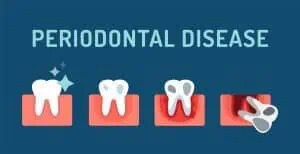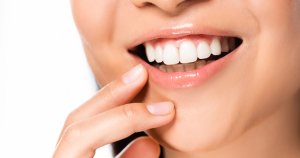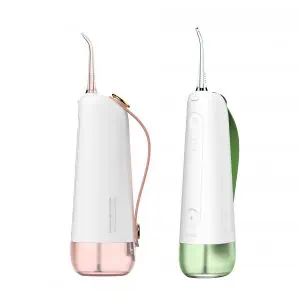The benefits of water flossing far outweigh the disadvantages, so it’s worth adding to your oral hygiene routine. Water flossers have been around for years, but recently they’ve become more popular.
This is due to the fact that they are as efficient at removing plaque and food particles from your teeth as traditional string floss, but easier to use.
Flossing is a must for good oral health, so it’s worth adding to your routine in some way. Whether that’s with water flossers or traditional floss, or both! But whatever method makes you floss regularly will be the right one for you.
This article will take you through our top 5 water flosser benefits and answer the following questions:
- What is a water flosser?
- Which water flossers are best?
- Do water flossers have any disadvantages?
So, if you’re undecided on whether or not to buy one yet, keep reading. Hopefully, this article will help you make an informed decision.
What is a water flosser?

A water flosser is a device that cleans your teeth using a jet of water. Water flossers are an alternative to string floss, and can be used instead of or in addition to brushing and mouthwash.
Water flossers are most effective for people with braces, those who have gum disease (periodontitis), or who have difficulty using string floss. They’re also useful for people with dental implants or crowns because they’re gentler than string floss.
If you’re unsure if a water flosser is right for you, talk to your dentist. In the following video, a dental hygienist explains how you can benefit from using a water flosser:
Now, let’s get started with the 5 benefits of water flossing.
Removes plaque
Though many of us are aware of the importance of brushing our teeth, most of us don’t realise that there is another part of our dental hygiene routine that can be equally as important: flossing.
Water flossers are an effective tool for removing plaque from between teeth and along gum lines. Plaque is a sticky film made up of bacteria and food particles. It builds up on your teeth throughout each day, providing a breeding ground for harmful bacteria that lead to cavities, gingivitis (inflammation) or periodontitis (inflammation around the tooth and bone).
Water flossing helps remove plaque before it gets the chance to harden into tartar—a substance similar in appearance to mineral deposits found in water pipes or kitty litter boxes—which must then be removed by a dentist using special tools called curettes or scalers.
Water flossers also have additional benefits over traditional string floss: they can reach more surfaces inside your mouth than string does. They arguably provide better cleaning power because they force water under high pressure into the tightest spots around your teeth.
Certain models even come with attachments that make cleaning hard-to-reach areas such as periodontal pockets and between teeth easier than ever before!
Prevents periodontal disease
One of the most common oral diseases is periodontal disease. With this condition, an infection of the gums and surrounding tissue spreads to your teeth. The bacteria that cause periodontal disease can also destroy bone and make it more difficult for you to keep your teeth healthy.

Water flossing helps prevent periodontal disease by removing plaque from under your gum line that a toothbrush cannot reach. And, as mentioned above you can purchase some models of water flossers that have special nozzles that can reach periodontal pockets.
Water flossing may also help with gum disease because it keeps your gums strong and healthy by removing food particles and bacteria that could lead to inflammation or infection. And, water is gentle enough on gums so there is no need to worry about damaging them during use.
Cleans in between braces and bridge work
Water flossers are a great tool for cleaning between braces, bridges and other restorative dental work.
If you have braces, then you know that flossing can be a real pain, but you still need to do it. Particles get stuck in wires and brackets, which can lead to gum disease or tooth decay. The water pressure from the water flosser helps dislodge these particles, which is important for keeping your smile looking healthy.
Water flossers are a great alternative to traditional string floss because they’re designed to get into the nooks and crannies of your mouth that string or tape floss just can’t reach. They are also great for kids’ braces because it’s easy for them to use and doesn’t hurt their mouths as string floss does!
The following video shares the benefits of water flossing with braces, and how to do it:
Many people don’t realise that water flossing can be an effective way to clean around bridges, crowns, implants and other restorative dental work. Bacteria, food residue and plaque can build up where the hardware is anchored in your mouth, which could lead to the restoration failing.
Water flossing can remove debris from around these areas without damaging your gums or sensitive teeth. The water pressure is strong enough to clean around the hardware, but gentle enough to not cause damage or irritation to gums or sensitive teeth.
Reverses early gingivitis
Gingivitis is a form of gum disease that occurs when plaque and tartar build up on your teeth. The deposits irritate the gums, loosen the tissues supporting your teeth, and can cause tooth loss if not treated.
If you have gingivitis in its early stages, it can be reversed simply by brushing and flossing daily. Water flossing will help remove plaque from hard-to-reach areas between your teeth that are otherwise difficult for traditional dental floss to access.
Improves gum health
Water flossing not only helps to reverse early gingivitis it can help to improve your overall gum health. It gently massages your gums and cleanses hard-to-reach areas that regular brushing doesn’t reach—like deep between teeth or below the gum line where toothbrush bristles can’t reach. To summarise, using a water flosser can help to improve gum health by:
- Removing plaque, food particles and bacteria
- Being quick, easy and convenient to use
- Massaging gums and improving blood flow
- Being gentle on gums and causing no damage

Using a water flosser is a good addition to your oral hygiene routine
Water flossers are a great addition to your oral hygiene routine. They are easy to use and as some argue just as effective as traditional string floss or manual flossing.
In fact, studies have shown that using a water flosser can remove up to 87.23% of plaque bacteria—which is very close to the 89.09% achieved by string floss.
What are the pros and cons of water flossing?
Water flossing offers many benefits and few disadvantages. The main disadvantages are that you need to charge the device, and some models are quite bulky if you want to use them on the go. They can also be messy to use and may require some practice before you get the hang of using them without getting any water on yourself.
The following table summarises the pros and cons of water flossing:
PROS | CONS |
|
|
Which water flossers are best?
The water flosser that is best for you depends on your needs and budget. We recommend Waterpik’s products because they are a popular brand and have a wide range of products. You can read more about the different models of Waterpik water flossers available in our full review here.
If you want something more compact and travel-friendly, we recommend Oclean’s W10 model, which is cordless and ergonomic. You can read more about it in our full review here.
Both Oclean and Waterpik have water flosser models that include different tips such as the periodontal tip to help reach certain areas of the mouth. So, if you are looking for a water flosser for periodontal disease or to help remove tonsil stones, either of these brands could be right for you.
Conclusion
There are numerous water flossing benefits. Not only does it help remove plaque, but it also helps prevent periodontal disease and reverse early gingivitis. It’s also good at cleaning in between braces and bridge work, as well as improving gum health overall!
Water flossers are easy-to-use devices that use pressurised streams of water to remove plaque from between teeth and below the gum line where toothbrushes can’t reach. The pressure of the water cleans deeply without causing any discomfort or damage to soft tissue like gums or teeth.
If you’re interested in buying a water flosser to add to your oral hygiene routine, we recommend checking out the brands Waterpik or Oclean. Both have models that include special tips for reaching those hard-to-reach areas. If you want a larger countertop model then Waterpik has some great choices, or if you are looking for something portable and ergonomic then the Oclean W10 might be the right flosser for you.
ScienceDirect. Comparison between water flosser and regular floss in the efficacy of plaque removal in patients after single use. Consulted 7th September 2022.





